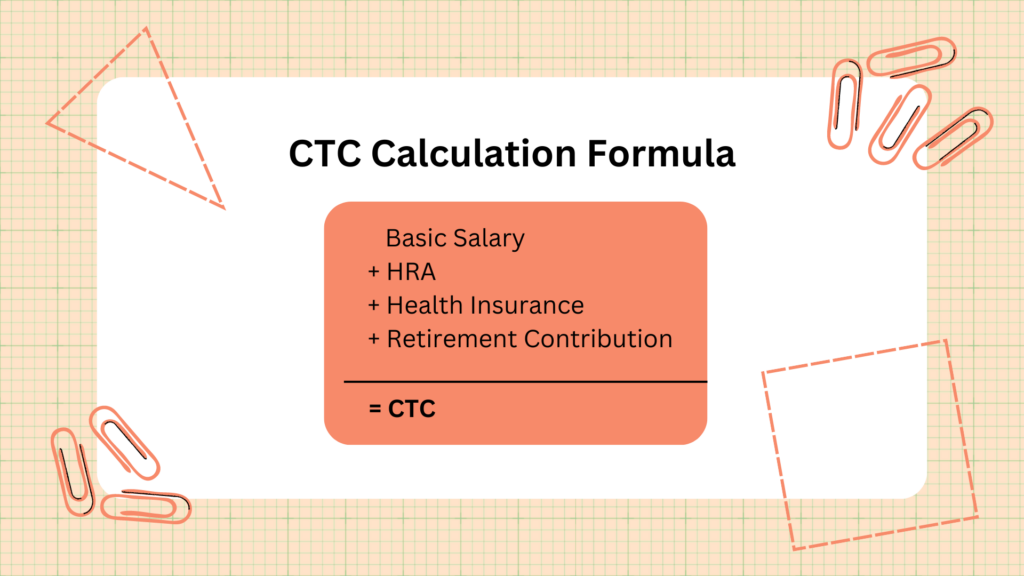Ever wondered what CTC in salary means? Whether you’re a job seeker, a fresh graduate, or someone looking to understand their paycheck better, CTC is a term you should know. CTC stands for Cost to Company, and it’s a crucial concept in the corporate world. This guide will walk you through what CTC is, its components, and how it impacts your earnings. Let’s understand!
What is CTC in Salary?

When we talk about cost to comapany in salary, we are referring to the overall financial commitment a company makes towards an employee annually. This includes:
It’s an all-inclusive figure that reflects the total cost of hiring and retaining an employee, both in terms of direct salary and additional perks.
What is CTC?
CTC full form stands for Cost to Company. It refers to the total amount a company spends on an employee in a year. This includes not only the basic salary but also a wide range of other benefits and contributions, such as allowances, insurance, bonuses, and retirement benefits. Understanding Cost to Company helps you get a clear picture of your total salary package and all the perks that come with it.
Constituents of CTC
It includes various components, both direct and indirect, that contribute to the overall cost. The components of CTC typically are:
1. Basic Salary: The fundamental part of the salary, usually 35-50% of the Cost to Company.
2. Allowances:
- House Rent Allowance (HRA): A stipend provided to employees to meet housing rent expenses.
- Dearness Allowance (DA): An allowance given to cope with inflation and the cost of living.
- Conveyance Allowance: Compensation for travel expenses between home and workplace.
- Medical Allowance: Reimbursement for medical expenses.
- Special Allowance: Any other allowances specified by the employer.
3. Bonuses and Incentives:
- Performance Bonus: Based on individual or company performance.
- Annual Bonus: Often a percentage of the annual salary.
- Sales Incentives: For employees in sales roles, based on sales performance.
4. Benefits:
- Health Insurance: Coverage provided by the employer for medical expenses.
- Life Insurance: Coverage provided in case of the employee’s death.
- Retirement Benefits: Contributions to retirement funds like the Employee Provident Fund (EPF) or National Pension Scheme (NPS).
5. Perquisites:
- Company Car: Provision of a vehicle for personal and professional use.
- Accommodation: Company-provided housing or housing rent reimbursement.
- Meal Vouchers/Coupons: For meals and refreshments.
6. Gratuity:
A lump-sum payment made to an employee at the end of their tenure, provided they have completed a minimum number of years with the company (typically five years in many countries).
Use Zimyo’s Online Gratuity Calculator.
7. Provident Fund (PF) Contributions:
Both employer and employee contributions to a government-mandated retirement savings scheme.
8. Leave Travel Allowance (LTA):
Reimbursement for travel expenses incurred during holidays.
9. Stock Options: Offering employees the opportunity to buy company shares at a later date at a predetermined price.
10. Education Allowance: Reimbursement for the educational expenses of the employee’s children.
These components can vary based on the company’s policies, the employee’s role, and the country of employment.
Check Out Our to Learn About Employee Benefits in Detail.
Why CTC is Important?
Understanding what is cost to company, should be the top priority when considering a job offer. CTC in salary helps employees:
- It sets realistic expectations for monthly in-hand salary.
- Allows you to negotiate job offers wisely.
- Plan your financial goals without confusion.
For employers this gives a comprehensive measure because it includes benefits beyond direct salary.
Categorisation of the Components of CTC
1. Direct Benefits
Direct benefits in CTC include your basic salary, house rent allowance (HRA), and other cash components that you receive monthly. These are the amounts that are directly credited to your bank account and form a significant part of your cost to company.
2. Indirect Benefits
Indirect benefits are non-cash components included in your CTC. These can be health insurance, company car, meal coupons, and any other perks provided by the employer. Although you don’t receive these benefits in cash, they add substantial value to your overall compensation.
3. Saving Contributions
Savings contributions are another critical part of CTC. This includes contributions to your provident fund (PF), gratuity, and other retirement benefits. These contributions might not be immediately available to you, but they ensure long-term financial security.
How to Calculate CTC?

Calculating CTC can seem daunting, but it’s quite straightforward once you understand the components. Add your basic salary, allowances, bonuses, and indirect benefits to get your total cost to company.

An Example of CTC Calculation
Let’s say your basic salary is ₹3,200,000 per year. You receive a house rent allowance (HRA) of ₹800,000, health insurance worth ₹240,000, and a retirement contribution ₹400,000. Your CTC would be:
CTC = Basic Salary + HRA + Health Insurance + Retirement Contribution
CTC = ₹3,200,000 + ₹800,000 + ₹240,000 + ₹400,000 = ₹4,640,000
Know Your Salary and Its Components Through a Salary Calculator
A salary calculator can be a handy tool to understand your CTC better. By entering your salary components, you can get a detailed breakdown of your CTC, helping you to understand what each component contributes to your overall compensation.
Now-a-days, a diverse range of salary calculators are available. To name a few prominent ones; take-home salary calculators and income tax calculators are mostly used.
Use Our In-Hand Salary Calculator to Know Your Monthly Salary.
CTC vs Gross Salary vs In-Hand Salary: A Quick Comparison
| Parameter | CTC (Cost to Company) | Gross Salary | In-Hand Salary |
|---|---|---|---|
| Definition | Defined as the total annual cost a company spends on an employee | Salary before deductions, excluding employer benefits | Amount credited to your bank account after deductions |
| Includes | Basic + Allowances + Bonus + Employer Contributions + Perks | Basic + Allowances | Basic + Allowances – Deductions |
| Excludes | Nothing – includes all costs | Employer contributions (PF, gratuity, insurance) | Tax, PF, Professional Tax, other deductions |
| Value | Highest | Lower than CTC | Lowest |
| Purpose | Shows overall cost to employer | Shows pre-deduction salary | Shows actual monthly income |
Conclusion
Understanding CTC in salary is crucial for every professional. It gives you a broad view of what you’re truly earning and helps you make informed financial decisions. By knowing the components of your CTC, you can better negotiate your salary and benefits, ensuring you get the most out of your employment package. So, the next time you see the term CTC, you’ll know exactly what it entails and how it affects your overall compensation.
FAQs
What is the full form of CTC?
CTC stands for Cost to Company.
Is CTC the same as take-home salary?
No, your take-home is usually lower because of tax and deductions.
What is the difference between CTC and gross salary?
CTC includes gross salary plus employer contributions and perks.
Does CTC include bonuses?
Yes, annual bonuses and incentives are part of CTC.
How can I calculate in-hand salary from CTC?
Subtract PF, taxes, and deductions from your gross salary.







